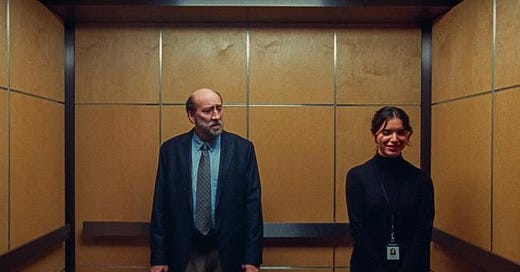PFF 2023: 'Dream Scenario,' Bucky F*cking Dent' and 'Rustin'
Reviewing three films from this year's 2023 Philadelphia Film Festival
We’re into the full week of Philadelphia Film Festival movies, and here are reviews of three movies that have been shown so far at the Philadelphia Film Festival.
Dream Scenario
“Movie with a weird premise in which Nicolas Cage plays a weird guy and does a weird voice” is normally a pretty safe bet, and Dream Scenario, at least at first, seems to be working as intended.
In the film, written and directed by Norwegian filmmaker Kristoffer Borgli, Cage plays a mild-mannered college professor and failed author who, inexplicably, begins appearing in the dreams of seemingly everybody in the world. In the movie’s best idea, Cage appears in the dreams doing… nothing at all and acting in the same passive manner in which he lives his real life.
This all leads this nondescript dad into unexpected viral fame and Cage — channeling Michael Stuhlbarg in A Serious Man — keeps complaining that he never actually did anything. Cage is very, very funny in the part, doing a generally untraceable accent.
Eventually, things take a turn, Cage goes from hero to villain and dream to nightmare, and the film very quickly becomes a parody of influencers and cancel culture. At this point, Dream Scenario nosedives from an oddball stunner in the tradition of Being John Malkovich and instead becomes an extremely time-specific satire of our current time. It’s the kind of thing that’s going to age like mud.
It’s a shame though, because there is some good stuff here. Actress Dylan Gelula, a Philly native who strongly resembles the Jenner sisters, has a memorable turn that recalls Kristen Stewart’s in last year’s Crimes of the Future. There are also fantastic in-jokes, such as when Cage wakes up in the middle of the night and his bedside clock says 4:33. (Get it?)
Dream Scenario isn’t bad, but if “weird Nick Cage” is what you’re looking for, there are plenty of better options.
Bucky F*cking Dent
Can the hopelessness of being a Boston Red Sox fan, during their 86-year championship drought still resonate, now that the Sox have won the World Series four times since 2004? That’s one question raised by Bucky F*cking Dent, a film written and directed by David Duchovny, based on his novel.
Set in 1978, which was of course the year the obscure Yankee hit a home run to knock out the Red Sox in a one-game playoff, Bucky F*cking Dent is the latest of many films to explore the dynamics of fathers and sons across the backdrop of the game of baseball.
The son (Logan Marshall-Green), is Ted, a failed novelist in his mid-30s who works as a peanut vendor at Yankee Stadium and has long been estranged from his father. But when he finds out the dad, Marty (Duchovny), is dying of lung cancer, he seeks to reconnect while he still can. Marty also has a gorgeous hospice nurse Mariana (Stephanie Beatriz) to whom Ted takes a liking, while Marty turns out to have thwarted literary ambitions of his own.
Marty, despite living in Central New Jersey, is an obsessed Red Sox fan who lives and dies with the team. But because the MLB.tv out-of-market package was still decades away from being invented in 1978, he couldn’t watch the Sox on TV and could only learn if they won or lost from the next day’s newspaper. So Ted borrows a page from the 2003 movie Good Bye Lenin! and doctors the newspaper each day, to spare his dad the truth about the team’s collapse.
This gimmick makes little sense — why would the sports section of a paper in New Jersey have so many headlines about a team in Boston? — and is executed poorly, to the point where the film almost forgets about it. It’s one of quite a few things here that doesn’t add up. For one thing, the characters keep referencing the “Curse of the Bambino,” which didn’t become a thing until Dan Shaughnessy’s book of that name was published in 1990; Sox fans in the ‘70s wouldn’t have used that term.
Also, it’s hard to imagine Mariana wouldn’t have better romantic options than Ted, who is barely employed, lives with his dad, and sports perhaps the most unfortunate sideburns I’ve ever seen on a movie character.
Despite all that, the film somewhat rescues itself with its ending, which is affecting and moving. And will almost certainly be the last film ever made that associates Boston Red Sox fandom with hopelessness and loserdom.
Rustin
Bayard Rustin is one of those figures who has been given short shrift by history. A longtime top figure in the civil rights movement, Rustin was also more or less openly gay, which sometimes led to tension with his colleagues.
Now, he finally gets the full-on biopic treatment, Rustin, in which he’s played by Colman Domingo, who like Rustin is gay and a native of the Philadelphia area. Domingo delivers the performance of his career and one of the best in any movie this year, but the film itself is very flawed.
Rustin is directed by George C. Wolfe, a renowned director of the theater whose last film was 2020’s Ma Rainey’s Black Bottom, an August Wilson adaptation that was mostly set in small rooms. The script was written by Julian Breece and Dustin Lance Black, the latter of whom won an Oscar for writing the script of another movie about a gay political pioneer, Milk.
The new film, which mostly focuses on the preparations for the March on Washington in 1963, has a lot in common with both Milk and another film dramatizing an important event in the life of Martin Luther King, Jr., Ava DuVernary’s Selma. It often feels like a beat-for-beat recreation of the structure of Selma.
At its best, like Selma (and other films like Milk and Steven Spielberg’s Lincoln), Rustin is a shining example of what I call The Cinema of Political Strategy. We see the hero acting as a smart and shrewd political strategist, and like those other films, Rustin is very interested in Bayard Rustin’s alliances and rivalries with other activists at the time.
They’re played by a succession of great Black actors across a couple of generations. Glynn Turman is A. Philip Randolph, while his fellow Wire alum Michael Potts plays Cleveland Robinson. Jeffrey Wright is Rep. Adam Clayton Powell, Jr., while CCH Pounder is Anna Arnold Hedgeman. Chris Rock plays NAACP head Roy Wilkins, while Aml Ameen portrays Martin Luther King, Jr.
The scenes of these men and women in rooms arguing are the film’s best, even if I never stopped seeing and hearing Chris Rock as Chris Rock and not as Roy Wilkins Ameen, while talented, just doesn’t quite have the gravitas to play Dr. King. And the scene in which Pounder, as Hedgeman, complains about the lack of women on the March’s speakers roster feels more like checking a box than organic storytelling.
Much less successful are scenes in which Rustin gets involved in a love triangle with a young white staffer (Gus Halper) and a married minister (Johnny Ramey). I understand that the filmmakers wanted to not soft-pedal Rustin’s relationships with men, but both characters appear to be composites, and not much that happens in these scenes is especially interesting.
There’s one other pretty major thing that goes wrong here: The entire film, of course, builds up to the March itself, just as Selma led up to the march to Montgomery. But while that film’s staging of the Selma March was fantastic, Rustin’s depiction of the event never hands the grand scale that it should. It feels, for some reason, small.
Bayard Rustin received the Presidential Medal of Freedom, posthumously, from President Obama in 2013, and now Obama’s production company has produced the Rustin biopic. I just wish it had been better.
Dream Scenario comes out in theaters on November 10. Rustin comes out in theaters November 3 and on Netflix November 17. Bucky F-cking Dent has no set release date yet. The Philadelphia Film Festival continues through October 29.






